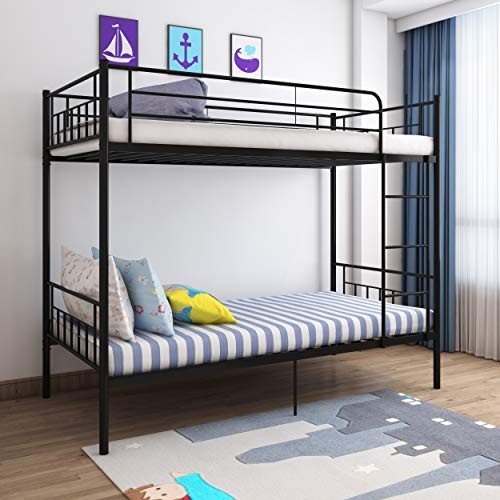Five Things You Didn't Know About Kids Bunk Bed
The Ultimate Guide to Kids Bunk Beds: Maximizing Space and Fun
With the rise of vertical living and smaller areas, the popularity of bunk beds has actually skyrocketed amongst families. Bunk beds not just offer a practical sleeping option, especially in shared spaces, but they also bring an aspect of enjoyable into a child's life. This thorough guide looks into the features, benefits, and considerations of kids' bunk beds, making it much easier for parents to pick the right bed for their kids.
Functions of Kids Bunk Beds
Bunk beds are versatile pieces of furnishings that serve more than a single purpose. Here are some essential functions to think about:
Feature
Description
Material
Bunk beds can be constructed from wood, metal, or a combination of both, using varying levels of durability and style alternatives.
Safety Features
A lot of bunk beds come geared up with guardrails, safe and secure ladders, and capped supports for security, particularly essential for young kids.
Style Variety
Choices range from classic designs to modern styles, ensuring a match for any room decoration.
Space-Efficiency
Bunk beds make use of vertical space, making them perfect for smaller sized rooms.
Convertible Options
Some models can be converted into 2 different beds, offering flexibility as kids grow.
Storage Solutions
Some bunk beds feature built-in storage drawers or shelves, helping to keep the room arranged.
Benefits of Kids Bunk Beds
Investing in a bunk bed features a number of benefits:
- Space Saving: Bunk beds maximize floor space, enabling more backyard or storage services.
- Fun Factor: With a bunk bed, kids belong that cultivates creativity and friendship during slumber parties or playdates.
- Affordable: Instead of acquiring 2 different beds, a bunk bed can accommodate two kids at when, saving money in the long run.
- Versatility: Many bunk beds can be disassembled or converted into twin beds, making them a long-term financial investment as children's needs alter.
- Social Interaction: Bunk beds encourage family bonding and relationships, providing an inviting space for children to share stories and laughter.
Considerations When Choosing a Kids Bunk Bed
When selecting the best bunk bed for a child, moms and dads ought to take into account different factors:
- Safety Standards: Ensure that the bunk bed adhere to security policies and features important security features.
- Age Appropriateness: Different designs cater to various age. For example, conventional bunk beds might not appropriate for younger kids.
- Room Dimensions: Measure the bed room to guarantee the bunk bed fits properly, enabling for space to walk around comfortably.
- Weight Capacity: Consider the weight load of each bed and ensure it accommodates the child's weight easily.
- Design Preferences: Letting kids take part in the choice procedure can assist them feel more fired up about their brand-new bed.
Types of Kids Bunk Beds
Bunk beds come in different styles and setups to match various requirements:
Type
Description
Standard Bunk Bed
A traditional style with one bed stacked on top of another, generally utilizing a ladder to access the leading bunk.
L-Shaped Bunk Bed
Functions two bunk beds linked in an L-shape, frequently more large and suitable for kids sharing a space however needing a bit more space.
Triple Bunk Bed
Comprises three stacked beds, ideal for taking full advantage of sleeping plans in really restricted areas.
Loft Bed
A raised bed with space underneath that can serve as a play location, research study corner, or additional storage.
Futon Bunk Bed
Integrates a bunk bed on leading with a futon or sofa underneath, making it great for sleepovers and taking full advantage of room use.
Convertible Bunk Bed
Can be separated into 2 private beds, providing flexibility as kids's requirements change.
Caring for Kids Bunk Beds
Keeping bunk beds is vital for ensuring durability and safety. Here are some simple care practices:
- Regular Inspections: Check the bed regularly for loose screws and tightened bolts to guarantee stability.
- Cleanliness: Keep bedding tidy and fresh, turning mattresses for even use.
- Guardrails: Ensure guardrails are safe and in location, particularly if children tend to walk around a lot in their sleep.
- Air Circulation: Ensure the bed has enough air flow, preventing wetness accumulation that can cause mold or mildew.
FAQs About Kids Bunk Beds
Q1: At what age can a kid safely use a bunk bed?
A1: Generally, kids aged six and older are considered safe to use the upper bunk due to the height and stability factors involved.
Q2: Can I place a bunk bed near a window?
A2: It is advisable to prevent placing a bunk bed near windows to reduce the risk of falling or injuries.
Q3: Are bunk beds safe for more youthful kids?
A3: While some modern bunk beds include safety functions accommodating younger kids, it is generally recommended to wait up until they are older, generally over 6 years.
Q4: What is the common weight limitation for top bunks?
A4: Weight limits vary by model however generally range from 150 to 250 pounds. Always refer to Space Saving Bunk Beds maxbogus.top .
Q5: How often should I inspect the bunk bed's security features?
A5: It is suggested to conduct a safety check every few months or whenever you see any signs of wear.
Kids' bunk beds act as a strategic solution for households seeking to maximize space while providing an enjoyable and engaging sleeping environment for their children. With a range of options available— from basic styles to loft beds— moms and dads have the liberty to select something that fulfills their family's particular requirements. By thinking about important elements such as security, room suitability, and their kids's preferences, parents can make an educated option, guaranteeing that each kid is thrilled about bedtime while gaining from a well-organized room.
